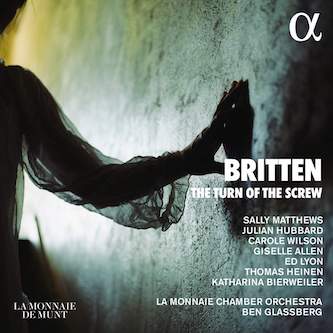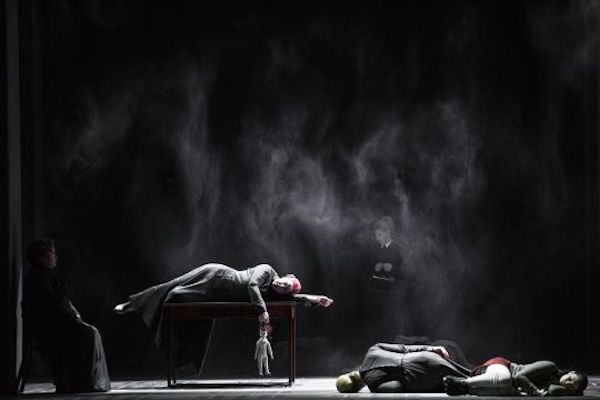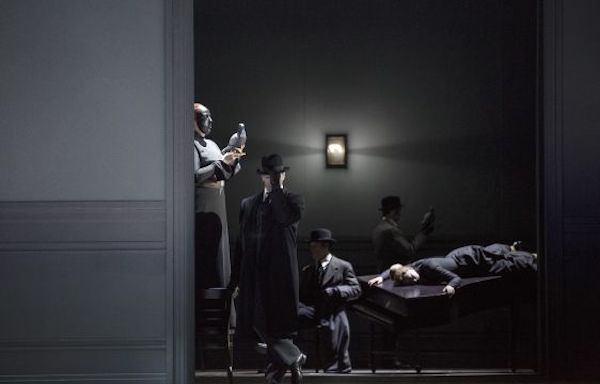Opera Album Review: Still Haunting After All These Years — Benjamin Britten’s “The Turn of the Screw”
By Ralph P. Locke
A new recording of Benjamin Britten’s remarkable 1954 opera packs considerable ghostly punch.
Benjamin Britten: The Turn of the Screw
Sally Matthews (The Governess), Carole Wilson (Mrs. Grose), Giselle Allen (Miss Jessel), Julian Hubbard (Peter Quint).
La Monnaie Chamber Orchestra/ Ben Glassberg.
Alpha 828 [2 CDs] 105 minutes. To purchase or listen to the beginnings of each track, click here.
 Britten’s best-known opera besides Peter Grimes has had many different recordings and stagings. In two tightly organized acts, it evokes — thanks in large part to the mysterious short story by Henry James upon which it was based — a wide range of moods that called forth a brilliant variety of musical responses from Britten. The musical style is quite direct — predominantly tonal, though colored at many points by a limited use of serial techniques. The vocal lines are magnificently singable and subtly word-colored, as so often in Britten’s vocal works. Not least, the instrumentation, for 13 instrumentalists (some playing more than one instrument), is exquisite and endlessly varied, and the sung scenes are separated, or set up, by 15 “Variations” for orchestra alone. One could listen to this work with pleasure for its instrumental part alone! As of course one can listen to Wagner’s or Puccini’s, but Britten’s Turn doesn’t resemble theirs in other respects.
Britten’s best-known opera besides Peter Grimes has had many different recordings and stagings. In two tightly organized acts, it evokes — thanks in large part to the mysterious short story by Henry James upon which it was based — a wide range of moods that called forth a brilliant variety of musical responses from Britten. The musical style is quite direct — predominantly tonal, though colored at many points by a limited use of serial techniques. The vocal lines are magnificently singable and subtly word-colored, as so often in Britten’s vocal works. Not least, the instrumentation, for 13 instrumentalists (some playing more than one instrument), is exquisite and endlessly varied, and the sung scenes are separated, or set up, by 15 “Variations” for orchestra alone. One could listen to this work with pleasure for its instrumental part alone! As of course one can listen to Wagner’s or Puccini’s, but Britten’s Turn doesn’t resemble theirs in other respects.
In this ghost-haunted tale, an innocent or perhaps secretly troubled young woman is hired by the young guardian of two parentless prepubescent children to be their governess, under the condition that she never contact him (their guardian) again. All the other characters she comes into contact with have something puzzling and even ominous about them (at least in her eyes, which at first are ours as well): the housekeeper Mrs. Grose, the two children Miles and Flora, and the ghosts of two dead individuals, namely Miss Jessel (the previous governess, who was perhaps inappropriate with Flora) and Peter Quint (the former valet, who perhaps preyed upon both Miss Jessel and Miles).
The new recording derives from three performances at the famous Théâtre de la Monnaie in Brussels. The costumes are highly stylized: characters are dressed in gray, with a few red accents. Omnipresent floating mist suggests the difficulty the Governess (whose name is never revealed in the libretto) had in making sense of the tangled relationships among the characters into whose midst she has been thrown. Or is the governess slightly unhinged by the responsibility and the isolation, leading her to imagine all kinds of slightly nefarious connections among the five individuals (living and dead) that she encounters?
In any case, the creepy events are repeatedly set into relief by simple songs and hymns — sometimes twisted a bit for extra oddity — that are sung by Miles and Flora. Near the beginning of Act 2, the two ghosts sing a duet in which each voices a longing for a companion: he specifies that his companion must be male, she that hers be female. The two sum up their shared mission in a disturbing phrase repeated several times: “The ceremony of innocence is drowned.” The line comes from Yeats’s famous poem “The Second Coming”; it echoes the somewhat ritualistic nature of the whole opera, which plays out before us at a certain remove.

A scene from the Théâtre de la Monnaie’s production of The Turn of the Screw. Photo: Bernd Uhlig
Experiencing the work in the theater or on one’s TV or computer screen can be an unsettling experience — like biting into a slightly overripe fruit, sweet and sour strangely mixed. Of course, in this audio recording we only have the sound to go on. The voices and the various solo instruments in the chamber orchestra are caught with clarity and in natural balance.
All the adult singers are highly accomplished (though the tenor who sings the prologue, Ed Lyon, has a wide vibrato that irritates). The singers are mostly native English-speakers, yet I often had trouble making out the words, in part because occasionally a singer would be too far from the microphone. Studio recordings of operas, by contrast, are close-miked and thus generally catch the words well, but often lack a sense of theatrical presence and forward flow, such as are well conveyed here.
I particularly appreciated the rich sound of Sally Matthews as the Governess and the bright, clear tone of Carole Wilson as Mrs. Grose: this reverses the usual casting and shines fresh light on both figures, making the Governess more overtly sensual and the housekeeper less of an aged fuddy-duddy. The two children’s roles are taken adequately but not memorably by members of a children’s chorus from Karlsruhe (Germany).

A scene from the Théâtre de la Monnaie’s production of The Turn of the Screw. Photo: Bernd Uhlig
Fortunately, the booklet contains the full text in English and in a fine French translation. It also offers an insightful article by the conductor, Ben Glassberg, who won the Besançon conducting competition at 23 and was still a mere 27 at the time of this recording (April-May 2021).
It would be hard to name a “best” rendering of this ever-effective opera. Still on the market are numerous CD, DVD, and digital-download options featuring such remarkable opera singers as Jennifer Vyvyan, Helen Donath, Felicity Lott, and Joan Rodgers (as the Governess) and Peter Pears, Robert Tear, Ian Bostridge, and Mark Padmore (as Peter Quint; most Quints also sing the Prologue, unlike here).
If you don’t know this remarkable dreamlike work, you owe yourself the opportunity. With the clearly printed libretto in hand, this new recording is a fine place to start. The wonderful first recording (1954, in good mono), with Vyvyan and Pears and conducted by the composer, seems to be available only as a digital download now, though the CD version can surely be purchased on the second-hand market. The unsurpassable young Miles was sung there by David Hemmings, later to make a major career as a film actor (including in Blowup, the musical Camelot, and Barbarella).
Ralph P. Locke is emeritus professor of musicology at the University of Rochester’s Eastman School of Music. Six of his articles have won the ASCAP-Deems Taylor Award for excellence in writing about music. His most recent two books are Musical Exoticism: Images and Reflections and Music and the Exotic from the Renaissance to Mozart (both Cambridge University Press). Both are now available in paperback; the second, also as an e-book. Ralph Locke also contributes to American Record Guide and to the online arts-magazines New York Arts, Opera Today, and The Boston Musical Intelligencer. His articles have appeared in major scholarly journals, in Oxford Music Online (Grove Dictionary), and in the program books of major opera houses, e.g., Santa Fe (New Mexico), Wexford (Ireland), Glyndebourne, Covent Garden, and the Bavarian State Opera (Munich). The present review first appeared in American Record Guide and appears here with kind permission.
Tagged: Alpha-Classics, Ben Glassberg, Benjamin Britten, Ghost story, Henry James, La Monnaie Chamber Orchestra, Sally Matthews
